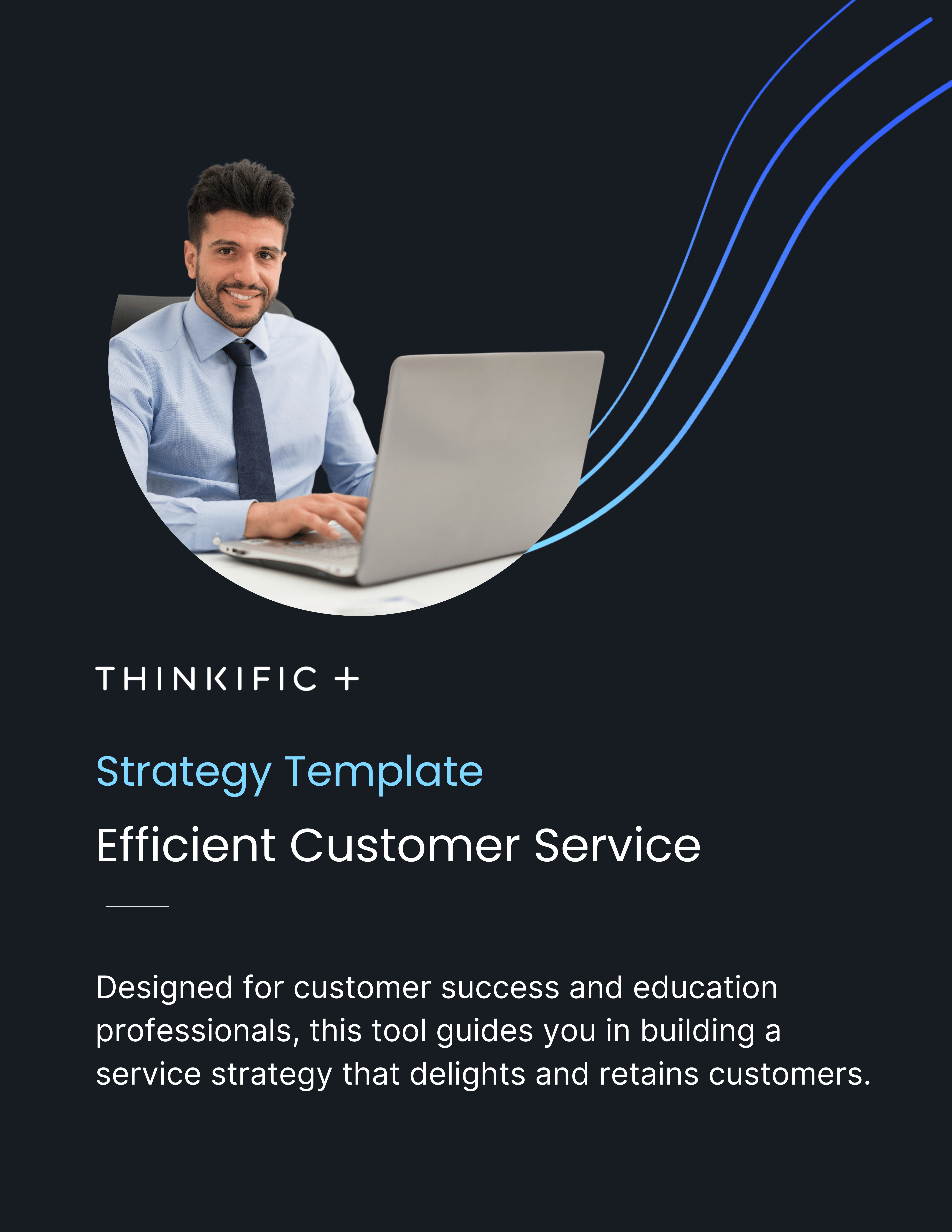
What comes to mind when you think of an amazing customer service strategy? Is it high levels of personalization and support? A great bonus and rewards system? Or speedy replies and prompt follow up?
One of the most important pillars of running your own business is having an effective customer service plan to increase customer retention and customer lifetime value (CLV). Ultimately, you want to create a pleasant journey of service interactions for customers before and after purchasing, so that your business remains number one in their eyes.
Whether you are just getting your business up and off the ground or if you are an established company looking to make a few tweaks, this guide will go through the details of a customer service strategy template that will forever change the way you approach your business plan. Remember, satisfied and happy customers = a very successful business!
Keep reading or skip ahead:
Ready to learn more? Let’s dive in!
Download our Customer Service Strategy Template to kickstart your journey to delivering exceptional customer experiences using our step-by-step guide to enhancing customer support.

So, what exactly is a customer service strategy, and how can you implement a customer support strategy framework into your business?
A customer service strategy is essentially a detailed plan to flawlessly facilitate and handle all customer interactions with your business. This includes targeting customers effectively before they connect with your business, and also conscientiously following up afterwards.
This customer-centric thought process won’t go unnoticed by your target audience, and soon after implementing this customer service strategy template, your customer satisfaction levels will increase and loyalty rates will subsequently rise.
Without a customer service improvement plan in your organization, it comes easy to get lost in the chaos of running a business. Think of your customer service strategy template as the glue that holds together all the pieces that are important for ensuring there is no disconnect between your business and your customers.
It’s vital for your business’s success to have a customer service strategy development in place, as this will spur growth and scalability within your business.
A solid strategy will support higher customer lifetime value and promote a strong brand reputation. It will also help build consistency among your consumers and streamline customer support and feedback processes for your employees.
A customer service strategy template is beneficial for both businesses and customers. It improves customer experiences and business processes for companies of any shape and size, and in any industry. Think of a customer service strategy template like the blueprints to a building – this sets the foundation, and is the map to creating a well-run and successful business. It displays all of the crucial elements of customer service neatly in a document that you can easily refer back to for your business needs.
Simply put, a customer service plan serves as a roadmap for streamlining and strengthening customer support. It gives employees clear instructions, helps your business understand customer needs and where to allocate resources, and provides insights for continuous improvement. It benefits both businesses and customers.
Creating a customer service strategy template offers many benefits, including:
Now, let’s explore important elements that make up a customer service strategy template.
Defining your customer service visionBefore you get started filling in your customer service strategy template, it’s important to think about the vision you have for your customers… What message are you trying to convey to potential customers? How do you want them to feel after interacting with your brand? Defining your vision will help you identify, clarify, and narrow down your service strategy development goals.
Think about these elements when crafting your customer-focused vision statement:
Customer service vision statement example: “To deliver exceptional service that exceeds customer expectations at every touchpoint.”
A vision statement informs the morale and spirit of your business, and it dictates your customer interaction guidelines. Ultimately, you’ll want your vision statement to be inspiring to your audience.
Making sure that your customer support strategy framework aligns with your business objectives will help ensure that your customer service template supports the strategic vision of your organization, helping deliver value to your consumers.
To align your service goals, think about the needs of your customers and your employees. This means identifying your target customers and their expectations, pain points, and their value drivers. It also means understanding your business vision, mission, objectives, and priorities.
Building your customer service teamIn order to deliver excellent customer service, you need to establish a well-trained and knowledgeable customer service team. This is one of the most important aspects in your customer service strategy template, as who you have on your team is a direct reflection of your brand’s mission and values in the eyes of your customers.
Creating an effective and efficient support team is all about outstanding levels of communication. It involves assigning clearly defined roles to team members and communicating performance expectations so that everyone is on the same page about the customer service strategy. This allows everyone to understand what they are contributing and how they can all work towards the same goals.
When building your customer support team, use the following guideline:
The following table outlines possible roles and responsibilities in a customer support team:
| Roles | Responsibilities |
| Managers |

Now it’s time to start thinking about the steps to developing your customer service process, and what these touchpoints will look like for your business.
To build long-term customer relationships that result in customer satisfaction, ensure that your business optimizes these five stages of the customer journey:
Most customer journeys don’t have a distinct end, so brands should always treat everyone – potential customers and even the most loyal customers – with the same high-quality service that’ll keep customers in the advocacy stage.
Customer communication is the interactions your business has with consumers, and is a vital step in your customer service strategy template. This is how your brand identifies touchpoints and builds a relationship at each one of them through various channels.
A great way to do this is to use omnichannel communication, which involves ensuring a continuous experience with no gaps, using various channels to connect with customers. It doesn’t matter if your customer contacts you through email, website, or multiple social media platforms – they’ll have the same amazing and supportive experience either way.
The key with implementing effective communication channels is to be consistent across all platforms, ensuring a seamless and smooth transition for customers. Trust us, if you do this well, your customers will subconsciously be impressed with the flawless ease of communication and advocate your brand to others!
A customer service checklist is a set of guidelines that an organization can reflect on to help deliver effective customer service and support team structure at various stages of the customer support journey.
This checklist may vary from company to company, but it includes all the necessary steps to improving customer experience and swiftly resolving any customer issues.
Here is an example of a customer service checklist:
In this digital age, it is essential for businesses to use technology to their advantage, especially when developing a customer service improvement plan. Customer service software is any program that helps a business provide support to their target audience who purchases products or services.
These are some of the essential customer service tools to consider adding to your customer service strategy template to help level-up your customer interactions:
There are a ton of tools out there that you can incorporate into your customer service strategy template for high-quality service delivery that your consumers will appreciate.
This technology will help facilitate customer support, and is often integrated with customer relationship management (CRM) software which assists businesses with all kinds of customer interactions, from the first point of contact to purchasing and beyond.
It’s worthwhile to invest in reliable customer service tools, as this will support your team with all the details you need to know about who your customers are – including where they’re coming from and what they’re searching for – no matter what channel they are using.
Setting goals and measuring successWith any sort of performance template, it’s important to get goals to measure your growth and success! Take a look at the strategies below to integrate into your customer service strategy template.
Customer service KPIs are key different metrics that help support your team’s ability to optimize and keep track of their performance. Essentially, KPIs measure customer success and help businesses understand customer interactions. KPIs will look different for every business, depending on company needs and goals.
Based on what customer service software you have in place, it can be easy and efficient to track, manage, and understand KPIs. Implementing these into your business will help you improve productivity, adjust operations, and better understand your customer relationships.
Here are some examples of KPIs for excellent customer service:
To ensure that your business is effectively improving your customer service strategy, it’s vital to regularly review your template and to improve strategies where needed.
Evaluating the quality of your customer service also ensures that you are consistently giving your customers the best service possible. It’s also helpful to develop and update an accessible online resource library with FAQs, tutorial videos, and informative articles for your customers.

Having a customer service strategy in place is vital for the long-term success of your business. The best way to get started with your customer experience optimization is to utilize a customer service strategy template to streamline the process. This will help keep you from feeling overwhelmed, and organize all of your customer service metrics in one place.
To grow your business, download our FREE comprehensive template for customer service strategy so that you can start delivering exceptional experiences. This template will provide you with the tools needed to leverage your own resources and elevate your customer support, improve satisfaction, and build lasting customer loyalty.
The best way to keep your customers happy is to make sure they’re getting the results they want from your product or service. That takes knowledge, and a Customer Training LMS Software is the only way to build that knowledge effectively at scale.
Thank you for exploring this guide to our customer service strategy template with us!
If you’re ready to take the next step and get personalized guidance to streamline your customer service strategy with online learning, get pricing details, and a live demo of Thinkific Plus, don’t hesitate to reach out to our experts.
Request a call with a member of our Thinkific Plus solutions team today, and let us help you unlock the full potential of your online learning journey.
This customer service strategy template aims to help you develop a seamless, positive experience for every customer, driving satisfaction and loyalty. Continuous evaluation and improvement will keep your customer service aligned with evolving customer expectations and business goals.
Make sure you plan ahead and use a quality template to help build and improve your customer service strategy. It’s never too early or late to get started, no matter where you are in your journey.
To develop a robust customer service strategy, make sure you define your goals, identify customer touch points, establish a knowledgeable team, benchmark using customer service tools and KPIs, and continuously set goals and use feedback to measure success.
Regular assessment and updates to your customer service strategy should be reviewed quarterly, and changes should be implemented based on your key performance metrics and through customer feedback.
Highly creative and curious about life, Megan is a blog writer and content creator who loves to inspire and uplift people with the written word. During her free time she is an avid yogi, travel junkie, beach enthusiast, and reader.

Most Popular

Explore everything there is to know about Net Promoter Score and access templates: Learn what it is, how to calculate it and improve it.

Learn how to grow your business by transitioning from selling your online courses B2C to business-to-business (B2B selling)

Learn about Time To Value, related terms, keys to improving, and case studies of companies that have effectively optimized for it.

Most Popular